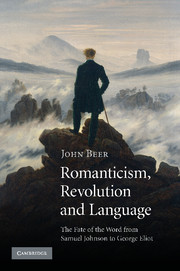Book contents
- Frontmatter
- Contents
- Preface and acknowledgments
- List of abbreviations
- 1 ‘Democracy’ in Somerset and beyond
- 2 Politics, sensibility and the quest for adequacy of language
- 3 The heart of Lyrical Ballads
- 4 The Prelude: a poem in process
- 5 Words or images? Blake's representation of history
- 6 Blake, Coleridge and ‘The Riddle of the World’
- 7 Challenges from the non-verbal and return to the Word
- 8 The Nature of Hazlitt's taste
- 9 Jane Austen's progress
- 10 Languages of memory and passion: Tennyson, Gaskell and the Brontës
- 11 George Eliot and the future of language
- Index
10 - Languages of memory and passion: Tennyson, Gaskell and the Brontës
Published online by Cambridge University Press: 04 August 2010
- Frontmatter
- Contents
- Preface and acknowledgments
- List of abbreviations
- 1 ‘Democracy’ in Somerset and beyond
- 2 Politics, sensibility and the quest for adequacy of language
- 3 The heart of Lyrical Ballads
- 4 The Prelude: a poem in process
- 5 Words or images? Blake's representation of history
- 6 Blake, Coleridge and ‘The Riddle of the World’
- 7 Challenges from the non-verbal and return to the Word
- 8 The Nature of Hazlitt's taste
- 9 Jane Austen's progress
- 10 Languages of memory and passion: Tennyson, Gaskell and the Brontës
- 11 George Eliot and the future of language
- Index
Summary
Some years ago, when I was invited to contribute to the Cambridge Guide to the Arts in Britain by providing the literary section of the volume relating to the years 1785 to 1851, I was made to realize once again how compartmentalized our treatment of literature has tended to be. We think of the Romantic period as falling between 1785 and 1830, and then of subsequent developments as ‘Victorian’. Yet, as Kathleen Tillotson pointed out many years ago, it can be a mistake to fence off the 1ate 1830s and the 1840s in this way. If those years are regarded as prudish, for instance, it has to be remembered that Bowdler's edition of Shakespeare had been made some years earlier and was not very representative of current assumptions, while the strong interest in fashionable subjects such as aristocratic manners, reflected in many novels of the period, was only slowly challenged and subordinated to the more middle-class ethos of the central ‘Victorian’ period.
It was also becoming evident to the inhabitants of the years in question that they had passed a crucial turning-point, and that the phenomenon that had made it so was above all the meteoric rise of the railways – the period of ‘railway mania’ falling particularly in the years 1846–8, when the opening of about 2,500 miles of new track virtually doubled the amount available until then. As Thackeray was to put it in his Roundabout Papers of 1860–3:
Then was the old world. Stage-coaches, more or less swift, riding-horses, pack-horses, highwaymen, knights in armor, Norman invaders, Roman legions, Druids, Ancient Britons painted blue, and so forth – all these belong to the old period.[…]
- Type
- Chapter
- Information
- Romanticism, Revolution and LanguageThe Fate of the Word from Samuel Johnson to George Eliot, pp. 175 - 199Publisher: Cambridge University PressPrint publication year: 2009



